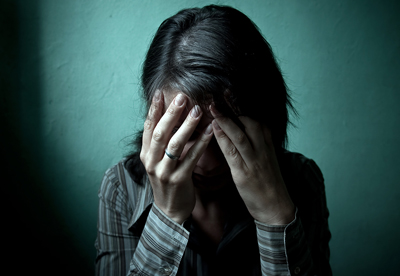By Sheba Siddiqui @shebasid and online at shebasiddiqui.com
When it comes to the subject of depression, many South Asians abide by the philosophy “if you ignore it, it will go away”. Toronto’s Serena M. was one such person for a very long time, until she knew she had to face her illness before it took over her life.
Serena first suspected something was wrong when she was in university. Studying at the University of Waterloo and living on campus, there were days she often could not get out of bed. She began missing assignments and completely isolated herself in her dorm room. At first, Serena thought this may have been university jitters and eventually dropped out and went home.
Because she was in denial about her mental illness, Serena thought her parents were to blame. She assumed they were the source of her unhappiness and it never crossed her mind that it could be anything else.
After some time, Serena remembers starting medication to appease her mother; however she was still not ready to admit there was a problem. “Twelve years ago, I was diagnosed with clinical depression and I was on antidepressants and therapy for a year but I got so angry with everybody that I came off of it,” said Serena. In the last twelve years, she has been diagnosed with several mental illnesses however never paid much concern.
When Serena met her husband, she thought her problems were gone. She was happy and healthy. It was only after he moved to England in late 2011 to further his education that the familiar feelings came back. She couldn’t answer the phone, leave the house, had no goals or desires and suffered from insomnia. There was a constant feeling of paranoia that people were out to get her. She says, “It can be seen as embarrassing. Nobody wants to be known as crazy. “
 Serena went to her doctor, completed a psychological evaluation and was diagnosed with major depression, dysthymia, anxiety disorder and agoraphobic tendencies. She says, “The actual diagnosis got me so down that I did not move from my couch for two months.” During that time, Serena did not leave her house, except to do groceries. She did not speak to or see anyone and would spend her days and nights in a daze.
Serena went to her doctor, completed a psychological evaluation and was diagnosed with major depression, dysthymia, anxiety disorder and agoraphobic tendencies. She says, “The actual diagnosis got me so down that I did not move from my couch for two months.” During that time, Serena did not leave her house, except to do groceries. She did not speak to or see anyone and would spend her days and nights in a daze.
“The biggest thing for me was that I feel like I had let myself down by letting myself get like this.”
Mississauga, Ontario resident, Rabia Din can relate to Serena’s feelings of loss and confusion. Rabia has first-hand experience dealing with depression because of her own mother, Tahira. She remembers recognizing it in her teen years. She says, “I started to see a change in her behaviour and even physical appearance. She would sit around staring at the empty walls; she was disengaged from conversations and was crying at things that didn’t make sense. She had all these feelings pent up inside of her, and she didn’t know how to deal with it.”
Rabia remembers talking to her mother about it and for many years, it was their secret. Her mother would cope by pretending it wasn’t happening until Rabia finally convinced her to seek professional help. “People don’t understand that depression is actually a chemical imbalance in your body, it is a medical illness and has some serious effects. My mom would have constant body aches and migraines. There were days when she couldn’t get out of bed at all.”
Now, Rabia’s mother Tahira speaks out in her community about her depression as much as possible. She wants people to know they are not alone, that it’s an illness and that the stigma must be shattered. Rabia wants people to know that depression is a serious illness that must be addressed. Pretending that it isn’t happening won’t make it go away and the South Asian community must be more accepting of this illness in order for people to come forward seeking help. She says, “Depression does not see class, race or gender. It affects people from all across the spectrum; a family member, neighbour or colleague may need help coping with this. Break the cycle of stigma in our community and assist them in getting the help that they need.” Rabia recently wrote a blog post around the stigma of her mother’s depression on her blog at www.rabiadin.com .
The Centre for Addiction and Mental Health in Toronto wants people to know that depression is more than just being unhappy. It can be a mood disorder that becomes a “significant mental health disorder.” The CAMH states a few causes of depression such as, “a genetic or family history of depression, psychological or emotional vulnerability to depression, biological factors such as imbalances in brain chemistry and in the endocrine/immune systems, or a major stress in the person’s life.”
“If you suspect you have depression you should talk to your doctor and explain any symptoms you might be having,” said Dr. Rohan Ganguli, senior scientist, CAMH. “Don’t be shy to tell him about the feelings you are having. The next step depends on your situation your resources and what access you have. You should also make sure you discuss the alternatives that are available when it comes to treatment.”
The CAMH website also states that depression affects women twice as much as men and that 13% of women will suffer from postpartum depression. This can be because of “menstrual cycle changes, pregnancy and postpartum, miscarriage, pre-menopause, and menopause.” Certain misconceptions are that people should just get over feeling blue and move on with life.
Serena understands the stigma behind mental illness. She says, “People don’t understand what mental illness is. They worry for victims of physical illness but fear someone with mental illness.”
Dr. Ganguli says sometimes stigma rooted in cultural misconceptions can exacerbate the problem.
“It can prevent you from seeking treatment. You may recognize that you have depression but the reluctance to seek treatment comes from social consequences of going for treatment. The worry about the reflection on the family and the way it might affect the chances of getting married, etc.,” said Dr. Ganguli. “For example some families believe, ‘if my daughter has depression, then how will this affect the chances of my other daughters getting married.’ When you’re already struggling with depression this can make things worse. One of the features of depression is that you tend to blame yourself, so if you’re worried about how it’s going to affect your own family, you will exacerbate the problem.”
“I think it’s frustrating for everyone who is dealing with it because you don’t get much support. You have runs for cancer; you have runs for lupus. These physical illnesses have a lot of support whereas the mental illnesses are quieter because the world prefers to ignore that part.”
 Serena believes many people do not get diagnosed because they don’t want to know or understand what is happening due to fear or embarrassment. Now, Serena feels that anti-depressants and her therapy group have changed her outlook on life. She says, “Meds brought me to a point where I can face this entire situation head on and attack it. The therapy helps me to deal with it. The pill is what keeps me stable; the therapy is what heals me.” She has a blog called www.bewilderedbug.com where she hosts Mental Health Mondays, a place to discuss mental illness, eliminate stigma and support each other.
Serena believes many people do not get diagnosed because they don’t want to know or understand what is happening due to fear or embarrassment. Now, Serena feels that anti-depressants and her therapy group have changed her outlook on life. She says, “Meds brought me to a point where I can face this entire situation head on and attack it. The therapy helps me to deal with it. The pill is what keeps me stable; the therapy is what heals me.” She has a blog called www.bewilderedbug.com where she hosts Mental Health Mondays, a place to discuss mental illness, eliminate stigma and support each other.
Serena feels blessed that she has a supportive and loving husband who understands her illness and has stuck by her through the difficult times. She also looks forward to the day she becomes a mother and although she worries that she may pass her illness on to her children, she also feels that it’s made her better prepared. She says, “I would like them not to be embarrassed. I would hope that they have a good understanding of it and are able to recognize it in themselves or others.”
As for Rabia, battling depression in her family has made her a stronger person. She says, “I was constantly worried about what could possibly happen if things got worse, if I wasn’t there when she needed me and what could be the possible outcomes. I would lie beside my mom for hours trying to cheer her up or make her laugh. Being a teen, I thought that would solve her problems, I was obviously a bit naive.”
“But now when I look back on it, I am so happy that it was me with mom and not somebody else. It has given us a bond that could never be broken.”
According to the Canadian Mental Health Association:
The main symptom of depression is a sad, despairing mood that:
• is present most days and lasts most of the day
• lasts for more than two weeks
• impairs the person’s performance at work, at school or in social relationships.
Other symptoms of depression may include:
• Changes in appetite and weight
• sleep problems
• Loss of interest in work, hobbies, people or sex
• Withdrawal from family members and friends
• feeling useless, hopeless, excessively guilty, pessimistic or low self-esteem
• Agitation or feeling slowed down
• Irritability
• Fatigue
• Trouble concentrating, remembering and making decisions
• crying easily, or feeling like crying but being not able to
• Thoughts of suicide (which should always be taken seriously)
• A loss of touch with reality, hearing voices (hallucinations) or having strange ideas
For more info you can visit www.camh.net.








Thanks for writing this! This article is so informative and much needed for the South Asian community. I currently work in the mental health field in hopes to de-stigmatized mental illness. Dr. Ganguli said it perfectly, that many parents fear that their child may not get married if other people know about the illness. But we have to remember that the child’s health is most important. I hope that people read this and start working toward improving their health. Thanks!